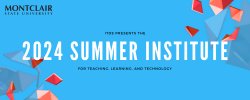June 5 — Fully Online

ITDS invites faculty to submit a proposal to present at this year’s Summer Institute conference. We hope you will join us!

Instructional Technology and Design Services (ITDS) invites you to our 2024 Summer Institute for Teaching, Learning and Technology. This faculty development event will kick off with keynote speaker Dr. C. Edward Watson, an Associate Vice President for Curricular and Pedagogical Innovation and Executive Director of Open Educational Resources and Digital Innovation at the American Association of Colleges and Universities (AAC&U).
Join your Montclair colleagues to collectively envision and prepare for the pedagogical opportunities that the future holds through the use of new education technologies and teaching strategies. This year’s theme embraces our teaching community and will create a space to discuss the shared experiences, opportunities, and challenges we face together as educators. Together, we will discuss what the future of education might look like and ways to strive for teaching excellence. Each day will include a variety of presentations and workshops to inspire, support and engage you.
Conference Theme: Forward Together
Deadline for Submissions: May 1, 2024
Generative AI tools, such as ChatGPT, Claude, Gemini, and others, have had an astonishingly quick impact on the ways we learn, work, think, and create, and this evolution is clearly apparent on college campuses. As early as January 2023, approximately 9 out of 10 college students reported using ChatGPT, and that number, as well as student competency with AI, has only grown since then. Throughout the academic year, AI will be present in our classrooms, and there are a range of opportunities and challenges as a result. Drawing from the presenter’s new book, Teaching with AI: A Practical Guide to a New Era of Human Learning (Johns Hopkins University Press), this keynote is designed to provide participants with clear guidance as they prepare for the coming semester. After a brief overview of the AI landscape, this session will shift to provide clear recommendations for pedagogical and classroom practice, including policy decisions, syllabus statements, grading, and academic integrity. Assignment design will be a hallmark of this keynote, and attendees can anticipate a discussion of if, when, and how we might embrace AI to achieve the learning goals of our course. Examples will be provided throughout.
Dr. C. Edward Watson is the Associate Vice President for Curricular and Pedagogical Innovation and Executive Director of Open Educational Resources and Digital Innovation at the American Association of Colleges and Universities (AAC&U). Prior to joining AAC&U, Dr. Watson was the Director of the Center for Teaching and Learning at the University of Georgia (UGA) where he led university efforts associated with faculty development, TA development, learning technologies, and the Scholarship of Teaching and Learning. He continues to serve as a Fellow in the Louise McBee Institute of Higher Education at UGA and recently stepped down after more than a decade as the Executive Editor of the International Journal of Teaching and Learning in Higher Education. His most recent book is Teaching with AI: A Practical Guide to a New Era of Human Learning. Dr. Watson has been quoted in the New York Times, Chronicle of Higher Education, Campus Technology, EdSurge, Consumer Reports, UK Financial Times, and University Business Magazine and by the AP, CNN and NPR regarding current teaching and learning issues and trends in higher education.

Stay tuned for the full agenda in the coming weeks!
For a view of the 2023 agenda and a list of presenters, please visit our Past Summer Institutes page.